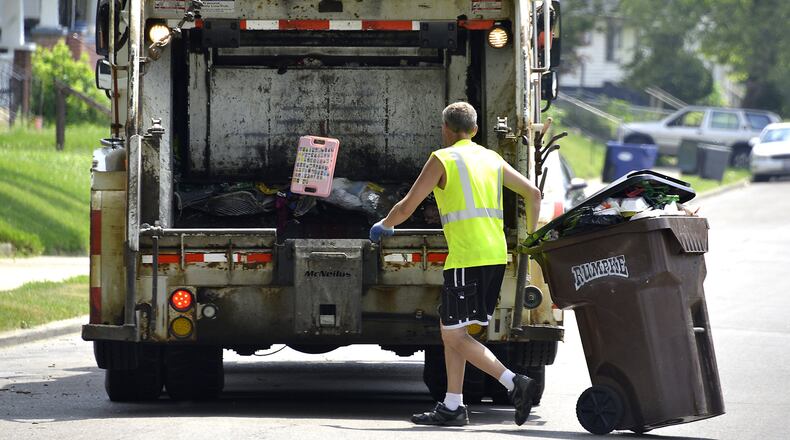Recycling collection is recommended to remain at every two weeks, rather than increasing to weekly. Residential trash collection will remain weekly.
Public Works Director Jim Williams said a committee evaluated whether it would be feasible to use a contractor other than Rumpke to try to find lower rates and concluded that was not feasible.
“Generally our customers were very happy with our trash and recycling service,” said Nathan Perry, Hamilton’s utility business manager. “And one of the top customer interests was weekly recycling pickup.”
Hamilton City Council will vote on the proposed contract in an upcoming meeting.
The contract also is to include two Saturdays per year when city residents can take large items and amount of other trash to the the transfer station for free. Those dates haven’t been determined, and officials are still working out what kind of proof people will have to provide to demonstrate they live within city limits to take advantage of those free days.
Also as part of the agreement, Rumpke crews no longer will handle collection of garbage from downtown trash cans. That task will be taken up by the city’s Quick Strike team, which will empty them twice per day.
“The recycling piece is a very difficult business model for all service providers … at this time,” Williams said.
Refuse handlers like Rumpke are struggling to make recycling a profitable business model, which is causing costs to rise, he said. That is caused in part by residents placing non-recyclable materials in recycling bins, which leads to sorting by hand.
Another recent recycling cost issue is China, which used to accept United States recycled items but has severely limited what it has been accepting.
Rumpke uses United States-based recyclers and therefore is a bit isolated from the China cost issues, officials said.
“Rumpke has done very well with who we’re selling material to, because we’re just a processor,” Hamilton’s Rumpke representative, Dean Ferrier, said. “I think 97 percent of everything we do is within 200 miles of here. But the rest of the country was sending it to China.
“Because of that, the ripple effect of supply and demand, domestically, all those other users on the West Coast and East Coast have nowhere to go with it. So the pricing index for commodities has plummeted,” for many months in a row.
Mixed paper sold for about $150 per ton a couple of years ago and now is at zero dollars, he said. Rumpke’s negotiated rates are higher that. While plastics, paper and cardboard have dropped severely, “aluminum is fine,” he said.
The country is getting better at recycling, but there’s a lot of “wishful recycling,” in which hopeful consumers put things in the recycling bins that they hope may be recycled. But the fact they place the items in the bins actually drives up costs, Rumpke spokespeople explained.
Fairfield recently had a program that aimed to educate its citizens about what can and cannot currently be recycled.
Williams said the city plans a communications campaign to educate residents how to properly recycle, and what not to put into their recycling bins, “and hopefully, as time goes on, maybe we can mitigate that increased expense.”
Hamilton’s Trash/Recycling Rates
If a contract with Rumpke is approved for trash and recycling collections in Hamilton, here is what the monthly residential rates will be in coming years:
Current Rate: $17.15
2020: $17.15
2021: $19.17
2022: $19.17
2023: $19.17
2024: $19.17
Source: City of Hamilton
About the Author
